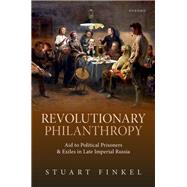Revolutionary Philanthropy Aid to Political Prisoners and Exiles in Late Imperial Russia
, by Finkel, Stuart- ISBN: 9780198916109 | 0198916108
- Cover: Hardcover
- Copyright: 9/23/2024
In late nineteenth-century Russia, a series of organizations emerged from the nascent radical liberationist movement for the purposes of providing aid to political prisoners and exiles. Those leading these endeavors framed them as a philanthropic exercise that was paradoxically always also political, provocatively appropriating the name and humanitarian mission of the Red Cross for their illicit attempts to assist the enemies of the Tsarist state. These efforts provided a unifying thread to the fractious and fragmented revolutionary movement over years and even decades. The unjustly persecuted political prisoner or exile came to serve as a powerful synecdoche for the tyranny of the autocratic state, while assisting these "suffering martyrs" came to be legible as an indisputably noble act across political and even national boundaries.
Revolutionary Philanthropy--the first book in any language to provide a comprehensive portrait of the origins of these organizations--posits that the groupings that undertook aid to political prisoners and exiles emerged through gradually accrued shared practices within a series of constantly evolving, overlapping domestic and international personal and political networks. In bringing together two seemingly incompatible modes of social action--radical politics and philanthropy--these "red cross" activities came to form a vital connective tissue across party and ideological lines. Moreover, they connected the still small and isolated groupings of committed revolutionaries to a significantly wider circle of sympathizers, both at home and abroad. Within Russia, this linked radicals to a significantly broader circle of liberals and politically uncommitted supporters, while revolutionary émigrés presented the Western public with a captivating narrative of heroic martyrs unjustly suffering for the cause. While the strain of conflicting imperatives threatened on multiple occasions to unravel the entire affair, in the end this very tension proved instrumental in making them durable.
Drawing on a wide range of archival sources inÂmultipleÂlanguages,ÂsomeÂof which have not been consulted before
Revolutionary Philanthropy--the first book in any language to provide a comprehensive portrait of the origins of these organizations--posits that the groupings that undertook aid to political prisoners and exiles emerged through gradually accrued shared practices within a series of constantly evolving, overlapping domestic and international personal and political networks. In bringing together two seemingly incompatible modes of social action--radical politics and philanthropy--these "red cross" activities came to form a vital connective tissue across party and ideological lines. Moreover, they connected the still small and isolated groupings of committed revolutionaries to a significantly wider circle of sympathizers, both at home and abroad. Within Russia, this linked radicals to a significantly broader circle of liberals and politically uncommitted supporters, while revolutionary émigrés presented the Western public with a captivating narrative of heroic martyrs unjustly suffering for the cause. While the strain of conflicting imperatives threatened on multiple occasions to unravel the entire affair, in the end this very tension proved instrumental in making them durable.
Drawing on a wide range of archival sources inÂmultipleÂlanguages,ÂsomeÂof which have not been consulted before






